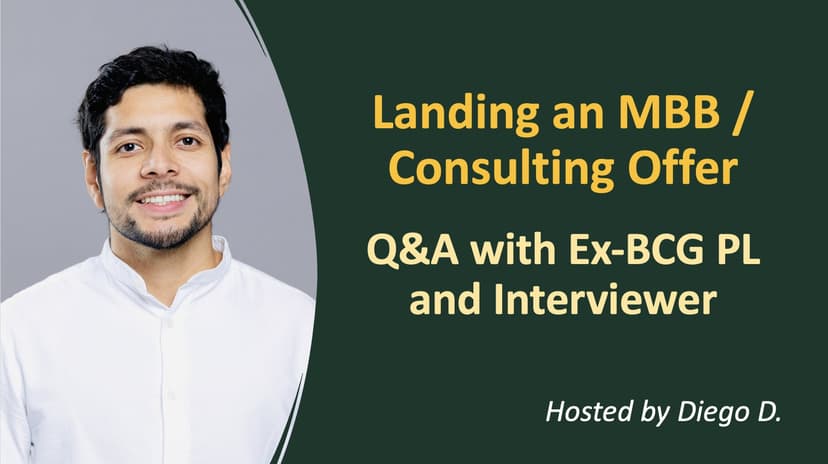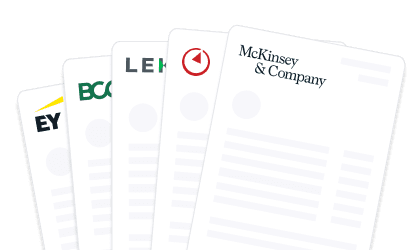What MBBs Are Looking For
Bain Interview Guide: Rounds, Questions, & Tips (2025)
Ace your Bain case interview with proven frameworks, sample questions, and expert tips to impress in both case and behavioral rounds.
Posted October 25, 2025

Join a free event
Learn from top coaches and industry experts in live, interactive sessions you can join for free.
Table of Contents
Bain is one of the most selective consulting firms, and earning an offer requires excelling in both the Bain case interview and the fit interview. Unlike McKinsey’s rigid approach or BCG’s quant-heavy style, Bain interviews are conversational, pragmatic, and focused on real client impact. Interviewers are looking for candidates who can combine sharp analysis and clear structure with authentic stories of teamwork and results.
This guide breaks down the full process, from interview rounds and question types to frameworks, sample examples, and a proven prep plan, giving you the tools to prepare, avoid common mistakes, and ultimately succeed in landing an offer at Bain.
About the Bain Interview Process
Bain interviews are designed to evaluate a candidate’s ability to think logically, communicate in a structured manner, and collaborate with Bain interviewers. Typically, the process involves two to three rounds:
| Stage | Interview Format | Focus Areas | What Interviewers Look For | Expert Insight |
|---|---|---|---|---|
| First-Round Interviews | Usually, two back-to-back interviews with consultants or managers. Each includes a Bain case interview and a short behavioral segment. | Tests core fundamentals: problem structuring, mental math, brainstorming practical solutions, and clear synthesis. Behavioral questions probe past experiences around teamwork and initiative. | Can the candidate apply a clear structure, stay calm under pressure, and communicate their answer in a way that feels client-ready? | Treat this round as a fundamentals check. Bain interviewers want to see that you’ve done the right preparation and can perform consistently under timed conditions. |
| Final-Round Interviews | Typically two to three interviews with partners or senior managers. Cases are more conversational and may involve pushback or pivots. | Probes deeper into business judgment and adaptability. Behavioral segments explore leadership, impact, and how your stories align with Bain’s values of humility and client focus. | Can the candidate handle challenging cases, adjust frameworks midstream, and reflect critically on past decisions while demonstrating authenticity? | Think of this as a simulation of client work. Partners want to know if you could succeed in front of a client tomorrow — confident, pragmatic, and collaborative. |
What sets Bain apart is its evaluation criteria. While every top consulting firm assesses problem-solving, the Bain company interviewers put additional weight on team orientation, client impact, and the candidate’s ability to adapt frameworks to practical business problems. Compared to McKinsey’s rigid structure and BCG’s heavy quantitative focus, Bain interviews are more conversational and pragmatic.
Evaluation Criteria:
- Business judgment - Can the candidate identify root causes and develop actionable recommendations?
- Communication - Does the candidate explain their thought process clearly?
- Teamwork and fit - Does the candidate connect naturally with colleagues and reflect Bain’s supportive culture?
What Makes Bain Case Interviews Unique
Among top consulting firms, Bain’s interview style stands out. Bain interviews emphasize collaboration, inviting candidates to discuss ideas openly with the interviewer. Instead of focusing on abstract theory, Bain cases test how you would solve problems in a way that aligns with real-world execution.
Bain case types often include:
- Profitability (e.g., declining margins at a manufacturer)
- Growth (entering new markets or launching new products)
- Market entry (expanding geographically or competitively)
- Private equity (Bain is particularly known for its PE due diligence cases)
- Operations (supply chain, process efficiency)
Here are examples of practice cases and mock interview tips provided by Bain to guide your preparation:
- Coffee Shop Co. Practice Case
- FashionCo. Practice Case
- Associate Consultant Mock Interview
- Consultant Mock Interview
- Written Case Interview Tips
This conversational, problem-solving style makes Bain interviews both challenging and rewarding. As one PrepLounge forum contributor mentioned, “With only 72 hours to prepare, I had to focus on practicality, not perfection. That’s exactly what Bain rewarded in the end.”
Common Bain Case Interview Question Types
Bain case interview questions tend to mix structured problem-solving with creative brainstorming. Candidates should expect a balance of math-heavy drills and open-ended strategy discussions.
| Question Type | Example | Skill Tested |
|---|---|---|
| Profitability / Market sizing | “Estimate the size of the U.S. coffee market.” | Analytical skills, structured thinking |
| Data / Chart analysis | Interpret revenue trends in a case exhibit | Ability to analyze, business judgment |
| Brainstorming | “How could a hotel chain grow revenues by 20% in three years?” | Creativity, breadth of ideas |
| Recommendation / Synthesis | Provide a final conclusion to the client’s CEO | Communication, clarity, persuasion |
Remember: Bain interviewers aren’t looking for perfect math; they’re assessing the candidate’s ability to structure a messy problem and present a clear recommendation.
Frameworks for Cracking Bain Cases
While Bain expects you to use structured approaches, the Bain case demands more than memorized formulas. Instead, Bain values MECE logic that adapts creatively to the client situation.
- 4Cs - Company, Customers, Competitors, Costs. Simple but flexible for market entry or growth cases.
- Profitability Trees - Revenue vs. Costs, broken down further into price/volume and fixed/variable cost drivers.
- Value Chain Analysis - Maps where value is created or lost across suppliers, production, distribution, and customers.
But Bain interviewers especially appreciate custom frameworks. Demonstrating creativity shows you can develop strategies tailored to the client’s needs.
Pro Tip: Bain rewards candidates who connect structure to client impact. Show not just how you’d solve the case, but how your approach drives business results.

Sample Bain Case Walkthrough
To see how Bain evaluates candidates in practice, let’s walk through a simplified case interview scenario:
Case Prompt: A private equity firm is considering acquiring a regional fitness chain. Should they invest?
Step 1: Build the Structure
Frame the problem around three key areas:
- Market Attractiveness – size, growth, and competitive intensity
- Company Performance – revenues, margins, membership churn
- Operational Risks – scalability, management, external threats
Step 2: Analyze the Data
Suppose exhibits show:
- $1.2M average revenue per location
- 20% churn rate among members
- Fixed costs are heavily driven by leases and staff salaries
A strong candidate not only crunches the numbers, but also links them to client objectives: Is churn undermining recurring cash flows? Do margins support the PE firm’s target IRR?
Step 3: Explore Growth Levers
Brainstorm realistic options:
- Open new locations in underserved markets
- Introduce tiered membership pricing
- Launch digital fitness products to diversify revenue streams
Here, Bain interviewers want to see creativity, but grounded in what a client could actually execute.
Step 4: Deliver the Recommendation
Good answer: “Yes, acquire the chain.”
Great answer: “Yes, acquire, but only if we invest in retention programs to reduce churn, while simultaneously piloting digital services. This protects recurring revenue and opens new growth channels. Next steps would include stress-testing churn assumptions and validating demand for digital fitness.”
Expert Takeaway: Bain interviewers aren’t impressed by a checklist of frameworks. They’re looking for candidates who demonstrate business judgment, prioritize the right drivers, and translate numbers into a practical client-ready story
What good looks like: Correct math, logical structure, and some growth ideas. What great looks like: Crisp analysis, direct tie-back to investor goals, clear articulation of risks, and a phased plan with next steps.
Behavioral & Fit Interview at Bain
At the core of Bain’s fit interview is a search for authenticity. Interviewers want to see how your past experiences demonstrate resilience, collaboration, and measurable impact. They look for moments where you supported colleagues under pressure, drove meaningful results, and created tangible value for a client or organization. Strong candidates don’t just describe what they did, they show how they worked with others and why it mattered.
Example Behavioral Questions
Candidates should expect questions such as:
- “Tell me about a time you worked on a challenging project with a diverse team.”
- “Describe a situation where your work created tangible client impact.”
- “Give me an example of when you had to overcome resistance to implement a solution.”
What Bain interviewers listen for is not only the story but also how you deliver it. Clarity, humility, and relevance are essential.
Structuring Your Stories
The most effective responses follow STAR or PEARL frameworks, ensuring answers flow in a structured manner. Begin with the Situation and Task, then walk through your Actions, finish with Results, and, ideally, add a Learning.
STAR Example (Teamwork):
Situation: “During my internship at a consulting firm, I was staffed on a retail project where weekly deadlines were slipping.”
Task: “I was responsible for coordinating analyses across three analysts, but the team was struggling with duplicated work and misaligned outputs.”
Action: “I created a shared workstream tracker, clarified ownership, and set up daily 10-minute check-ins to keep us aligned.”
Result: “We hit all subsequent deadlines, reduced rework by 30%, and our manager specifically highlighted the improved collaboration in our end-of-project review.”
Learning: “I realized that structure and communication are as important as analysis, and I’ve carried that mindset into every team project since.”
PEARL Example (Client Impact):
Prompt: “Tell me about a time when your work made a real difference for a client.”
P (Prompt): “I was asked to support a cost reduction program for a healthcare client.”
E (Example): “The client faced rising operational expenses that threatened margins.”
A (Actions): “I analyzed vendor contracts, identified redundancies, and negotiated new terms with two key suppliers.”
R (Results): “The changes saved the client $2 million annually, exceeding the target by 20%.”
L (Learning): “I learned how to tie technical analysis directly to client objectives — a skill I know Bain interviewers want to see in action.”
This approach highlights the candidate’s ability to communicate crisply, stay organized under pressure, and reflect on growth. The best answers feel natural, not rehearsed, but they are always intentional in showcasing teamwork, results, and client orientation.
Bain vs. McKinsey & BCG: It’s important to understand how Bain’s approach differs from its peers. McKinsey’s PEI (Personal Experience Interview) is famously rigid and deeply probing, often with multiple follow-up questions designed to test consistency. BCG’s behavioral interviews can feel more analytical, sometimes linking stories back to problem-solving skills. Bain’s style is more conversational and pragmatic. Interviewers may discuss your story with you, test your reflection, and connect it back to Bain’s values of results, humility, and client impact.
How to Build Your Bain Interview Prep Plan
Success in Bain interviews requires structured, deliberate preparation over several weeks. The table below outlines a proven 4–6 week roadmap that moves from building fundamentals to simulating Bain’s conversational interview style.
| Phase | Focus Areas | Key Activities | Expected Outcomes |
|---|---|---|---|
| Weeks 1–2: Foundation Building | Candidates should concentrate on mastering the core mechanics of problem-solving and building structured thinking habits. | During this phase, you should drill mental math every day, work through market sizing questions, review Bain case examples and common frameworks, and record yourself to identify communication mistakes that need correction. | By the end of this stage, you will have developed fluency with numbers, gained familiarity with Bain-style cases, and become more aware of your own weaknesses. |
| Weeks 3–4: Skill Application | The focus shifts toward applying your skills in live settings and steadily improving through iteration. | This is the time to conduct 10–15 live case interviews with peers across different case types, log observations in a feedback tracker to monitor progress, develop and rehearse behavioral stories in a structured manner, and practice synthesizing insights into clear, client-ready messages. | At this point, you will be able to handle the dynamics of live interviews, improve your synthesis under time pressure, and polish behavioral answers that tie closely to your past experiences. |
| Weeks 5–6: Simulation & Mastery | In the final stretch, candidates should simulate Bain’s real interview style and refine their ability to perform under pressure. | You should complete four to five full-length mock interviews with expert coaches or experienced peers, simulate conversational dynamics with interviewer interruptions and pushback, refine recommendation delivery with a strong emphasis on client impact, and complete a final review in the last 48 hours before the interview. | By the end of this stage, you will have built confidence under pressure, proven your ability to adapt mid-case, and polished a delivery style that would stand in front of Bain partners and inspire success. |
Expert Insight: The most successful candidates treat this roadmap like progressive training; the early weeks build muscle memory, the middle weeks test resilience in live environments, and the final weeks simulate real interview conditions. By pacing your preparation this way, you enter Bain’s process ready to not just answer questions, but to perform at a client-ready level.
Final Tips to Succeed in Bain Interviews
Mastering Bain’s process requires more than memorizing frameworks. What often separates successful candidates from the rest is mindset, the ability to stay adaptable, pragmatic, and client-focused under pressure. Bain interviewers want to see not just how you break down a problem, but how you communicate with confidence and offer solutions that could realistically guide a client’s next move.
One of the most common mistakes is over-framing a problem with a rigid structure and never adapting it when new data emerges. Another is treating the case as a purely academic exercise, offering elegant but impractical recommendations that would never fly in the real world. The third is forgetting to tie every calculation and insight back to the client’s main question, leaving the interviewer wondering if you can keep sight of the bigger picture.
The final 48 hours before your interviews are critical. Instead of cramming dozens of cases, your goal should be to sharpen your edge while keeping your energy and confidence high. Review a few Bain-style examples to refresh your instincts. Run one or two light practice cases to keep your communication crisp, but avoid overloading yourself with new material. Most importantly, prioritize rest. Bain interviewers will notice whether you walk into the room alert, engaged, and ready to succeed. Fresh thinking always beats exhaustion.
To make the final stretch easier, we’ve created a downloadable prep checklist that maps out exactly what to review, how to pace yourself, and what to do in the last 48 hours. Use it as your day-by-day guide to stay sharp and walk into your Bain interviews with confidence.
Download the Bain Interview Prep Checklist
Turn Your Bain Interview Prep Into a Competitive Edge
The best way to master Bain’s interview style is to work with someone who’s been there. Our expert consulting coaches, including ex-Bain interviewers, will help you prepare, avoid common mistakes, and build the skills to succeed.
Browse Management Consulting Coaches here. Also, check out our management consulting recruiting bootcamp and free management consulting events for more strategic insights.
See: The 10 Best Consulting Coaches for Case Interviews & Resumes
Read next:
- Bain Cover Letter: The Expert Guide
- Bain Assessment (Gorilla Test): What it Is & How to Ace It
- Bain BEL Deadline: Important Dates and Tips for Success
- Consulting Case Interview Guide – With Examples
- Consulting Coffee Chats: The Ultimate Guide
- Top 10 Interview Coaches
- Top 5 Tips on Breaking Into Consulting (From an Ex-Bain Interviewer)
- What is Management Consulting?
- Consulting Resume Guide: Templates, Examples, and What MBB Looks For
FAQs
How is the Bain case interview different from McKinsey or BCG?
- Bain is more conversational and collaborative, while McKinsey favors rigid structures and BCG leans on quant-heavy analysis.
How many interviews does Bain usually conduct?
- Candidates should expect 2–3 rounds, with 2 interviews per round, including both a case and a fit interview.
How much time should I spend preparing for a Bain case interview?
- Most candidates spend 4–6 weeks of preparation, combining solo drills, peer practice, and expert feedback.
Can I use the same frameworks for Bain as I would for McKinsey or BCG?
- Yes, but Bain values adaptability. Demonstrating creativity and tailoring frameworks to the client is essential.
What’s the best way to practice for Bain interviews if I don’t have a partner?
- Use online resources, case books, or record yourself. PrepLounge also allows you to connect with peers virtually.
How do I know if I’m ready for Bain case interviews?
- If you can structure any problem, articulate clearly, and deliver recommendations under time pressure, you’re prepared to stand before Bain interviewers with confidence.






























